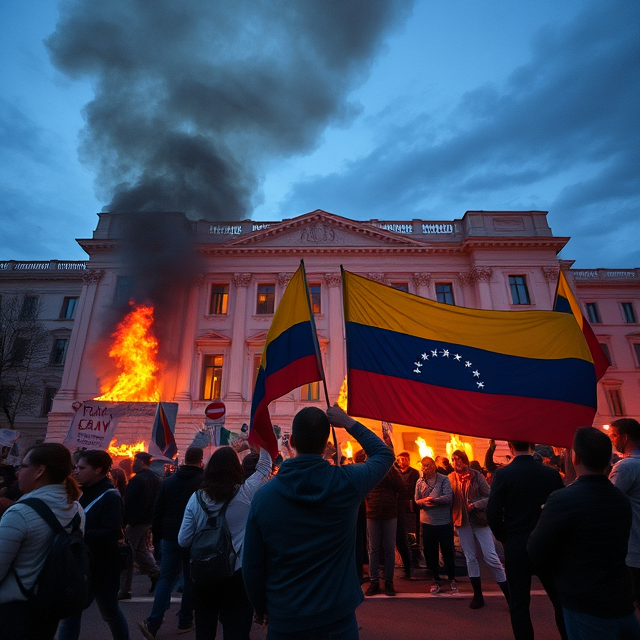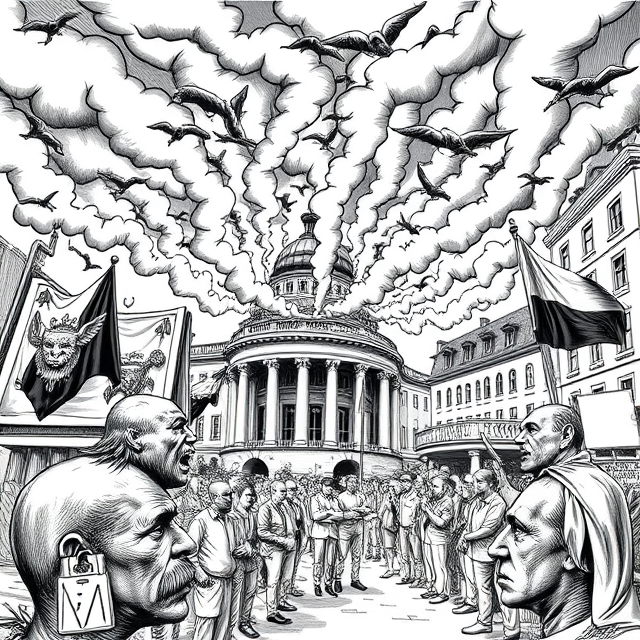
Vandalism against Venezuelan embassies worldwide reflects the spillover of internal political conflicts into international relations.
Violations of diplomatic immunity and safety norms risk escalating tensions between nations and undermining diplomatic norms.
The incidents underscore the need for dialogue within Venezuela to prevent further destabilization and maintain global diplomatic standards.
The Venezuelan embassy has become a point of interest recently after it was attacked and some of its properties destroyed in what has now been linked to some internal conflict in the country. This event also proves the instability of actual diplomacy of Venezuela; however, it also shows that internal political struggles also affect diplomatic missions. Venezuela’s foreign minister, Yván Gil on 15 January 2025 announced that the diplomatic compounds in Norway had undergone vandalism. This was one of the several similar attacks aimed at the facilities of the Venezuelan diplomacy in several countries including Portugal, Germany, Spain, Colombia, as well as Costa Rica. About these attacks, Gil blamed the opposition factions, singling out the grassroots, or ‘comanditos,’ meaning ‘small commandos,’ in English, for those attacks. He said that these groups were behind the attacks on the Venezuelan diplomatic missions and said that there should be probes in those countries to identify those involved in such vandalisms. The background to this event can also be explained by the political climate of Venezuela.

The incumbent president Nicolás Maduro has been sworn in for the third term in office for the next six years, but the elections controversy has increased significantly, and dissatisfaction with the government has generated opposition protests. The National Electoral Council which largely supports Maduro’s government announced him as the winner of the July election without releasing the comprehensive result. On the other hand, the opposition parties declared the candidate of Edmundo González as the winner of the election through electronic machines indicating huge margin in favor of their candidate and highly contrasting to the official result. Ever since the political leadership crisis emerged in Venezuela, the support for the Maduro’s administration has been greatly opposed by the opposition parties. The latter has often protested, demonstrated and committed nearly every act of unlawful behavior against what they consider an authoritarian regime. The recent vandalism incidents can be viewed as manifestations of this escalating conflict, where symbolic attacks on diplomatic missions serve as expressions of dissent against the government.

According to the sources, in Norway, the vandalism was done on Venezuelan symbols and property at the embassy. Despite a lack of information from Gil or other officials on further details on how the embassy was damaged, the Venezuela’s foreign ministry posted pictures featured a vandalized Venezuelan flag bearing graffiti words ‘Edmundo González’. This act is symbolic not only an aggression to the sovereignty of Venezuela but also to the representation of the country in another state. In Portugal, another event was an attack using a small incendiary device damaging the façade of the Venezuela’s consulate.
To this the Portuguese government categorized as an act of intolerance and vowed to improve protection measures around the Venezuelan establishments. This kind of events adds to global worry as diplomatic missions continue to experience attacks due to escalating political turmoil. That is why the Venezuelan government has demanded fast investigations of these actions and the corresponding pressure on countries like Portugal and Germany. Nonetheless, the major force of the opposition coalition, as far as this author is aware, has yet to react to Gil’s allegations instantly. This embassy could mean, the following is either a deliberate decision by these oppositions not to be associated with such acts or there is an element of disorganization among these opposition groups. Internationally the responses have depended on each nation’s political stand on Venezuela. Some of the countries which support Maduro may play down on such incidents or may blame them to external forces while others may see these events as people’s rebellion against an authoritarian government.
The incidents of vandalism considered are posing serious threats to the safety and security of the diplomatic missions around the world. Undermining diplomatic immunity and safety norms, it becomes sad to see that embassies and consulates become rivals’ territories of domestic political conflicts. The Vienna Convention on Diplomatic Relations establishes that diplomatic agents should be protected from any form of attack or insult; however, recent events suggest a growing disregard for these principles in politically charged environments. Moreover, such acts can lead to strained relations between nations. If countries fail to protect foreign embassies adequately or if they are perceived as harboring hostile factions against another state, it can lead to retaliatory measures or withdrawal of diplomatic personnel as well.
This cycle can escalate tensions further and complicate international dialogue on pressing issues such as human rights abuses and economic sanctions against regimes like Maduro’s. The vandalism at Venezuela’s diplomatic headquarters in Norway is emblematic of the broader political crisis facing the country today. It underscores how domestic conflicts can spill over into international relations, affecting not only bilateral ties but also global perceptions of legitimacy and governance. As Venezuela grapples with its internal divisions, the international community must navigate these complexities carefully to uphold diplomatic norms while addressing human rights concerns within Venezuela. The future trajectory will depend significantly on how both the Venezuelan government and opposition respond to these provocations and whether they can engage in constructive dialogue rather than resorting to violence or vandalism as means of expression. The situation remains fluid, and continued monitoring is essential to understand its implications fully for both Venezuela and its international partners.
References
- “Venezuela Accuses Opposition of Coordinating Attacks on Diplomatic Facilities in 5 Countries.” 2025. CNN. January 13, 2025. https://edition.cnn.com/2025/01/13/americas/venezuela-attacks-diplomatic-facilities-intl-latam/index.html.
- “Venezuelan Diplomatic Headquarters in Norway Is Vandalized – TeleSUR English.” 2025. TeleSURenglish. January 16, 2025.
- https://www.telesurenglish.net/venezuelan-diplomatic-headquarters-in-norway-is-vandalized/.
- María José Ramírez. 2023. “SaldoAr: This Is How You Can Exchange Your PayPal Balance for Bolivars – Últimas Noticias.” Últimas Noticias. April 12, 2023. https://en.ultimasnoticias.com.ve/news/politics/Venezuela.
- Sequera, Vivian, and Lisandra Paraguassu. 2024. “Diplomats Push for Progress in Venezuela’s Disputed Election.” Reuters, August 2, 2024. https://www.reuters.com/world/americas/venezuelan-opposition-movement-denounces-invasion-headquarters-2024-08-02/.
- Newman, Ed. 2025. “Venezuelan Foreign Ministry Denounces Vandalism at Diplomatic Headquarters in Oslo.” Radiohc.cu. Radio Habana Cuba. January 15, 2025. https://www.radiohc.cu/en/noticias/internacionales/374191-venezuelan-foreign-ministry-denounces-vandalism-at-diplomatic-headquarters-in-oslo.
- “Chancellor Denounces Vandalism at Venezuelan Embassy in Norway – Prensa Latina.” 2025. Prensa Latina – Latin American News Agency. January 15, 2025. https://www.plenglish.com/news/2025/01/15/chancellor-denounces-vandalism-at-venezuelan-embassy-in-norway/.
- PTI. 2025. “Venezuela Accuses Opposition of Coordinating Attacks on Diplomatic Facilities in 5 Countries.” The Week. January 13, 2025.https://www.theweek.in/wire-updates/international/2025/01/13/fes30-venezuela-diplomatic-facilities.html.
Shrivara Mahajan is pursuing an International Relations major with a minor in Public Policy at OP Jindal Global University. He is a Senior Intern at the Jindal Centre for the Global South and has priorly interned with The Spread Smile Foundation. Views expressed are the author’s own.
